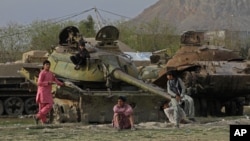The Soviet Union sent thousands of troops into Afghanistan during a Christmas Eve invasion in 1979 in an attempt to end the country's civil war and prop up an ally against Islamist insurgents. A proxy war ensued.
The U.S. and Arab states armed mujahideen Islamists who fought to push out Soviet forces. After a decade of bloody battles that cost around a million civilian lives, tens of thousands of mujahideen, and 15,000 Soviet troops, the Soviets withdrew.
Igor Yerin is director of the Afghan War Museum in Moscow and a veteran himself. Standing in front of a wall of photos of local Muscovites killed in the war, he says, "We thought we could have done more to stop the warring over the course of nine years.” He adds, “We weren't planning on fighting for a long period of time. Afghanistan showed us that difficult conflicts over extended periods are hard on the government."
Russia just started military strikes in Syria this month, ostensibly against the Islamic State (IS) terrorist group, although Western leaders say most of the attacks are not against IS at all but against enemies of Russian ally, Syrian President Bashar al-Assad. Meanwhile, the U.S.-led coalition has been bombing IS for months.
The situation raises fears of a proxy war, similar to the one in Afghanistan.
Not the same
Russian veterans of the Afghan War acknowledge the error of the war. “Of course sending the army into Afghanistan was a mistake,” said Alexander Razumov, chairman of the Russian Union of Afghan Veterans.
“Why was it a mistake? Because we should have known the history of those courageous people who love their deserts and mountains and will never let any foreigners run their country, no matter how great their ideas may be.” He added in summary, “Because the road to hell is paved with good intentions.”
Veterans, however, say a similar conflict in Syria is unlikely as long as ground troops are not involved.
Razumov repeats the government line: the only real threat is from those opposed to Damascus, who they collectively label as “terrorists.” He says the two conflicts have little in common. “So the differences are huge, in regards to tactics, we are only providing air support,” he said.
“The Syrian army is on the ground. Although, let me say that without a ground operation, it won't be so effective.” He added, “It would take a full-scale ground operation to clean out the areas seized by the terrorists."
But while the Russian public supports Russia's addition to coalition attacks on Islamic State terrorists, it is against using ground troops.
No tolerance for casualties
On the streets of Moscow, construction entrepreneur Abdul Khuzhallatipov tells VOA "We've learned from the Afghan experience, so I don't think we'll repeat it. Plus, this is the 21st century - our infantry won't go in, we'll just bomb using aviation.” He adds, “Maybe we'll provide some arms but I doubt it will turn into another Afghanistan."
"I don't think that Afghanistan and Syria are similar situations,” says international relations student Lyubov Sakhino, “because different militaries are involved.” She adds, “But, the roots I think are the same.”
"I think that there's no such [proxy] war,” says businessman Alexander Dokumentov. “But each side has its own goals for the anti-terrorist operation. Each side is chasing their own interests.”
“In the end, I think all the parties will find a compromise and all the issues will slowly be solved, including the presidency of Assad.” He adds, somewhat optimistically after almost five years of war, “I think an agreement will be found with the opposition so that peace reigns in Syria."
Russia is less tolerant of loss of life in foreign wars than during the Afghan War when thousands of deaths were kept quiet. Major General (retired) Vladimir Dvorkin, with the Carnegie Moscow Center, says body bags coming back to Russia from Syria could threaten Moscow's bombing campaign.
"I think that even minimal losses could have a serious impact on the whole situation,” he says. “That's the lesson we need to take — minimize casualties.”
He adds, “Because casualties could happen not just in the air. There could be attacks on our bases in Syria as well."
Russia's navy base in Tartus, Syria is its only Mediterranean port, giving more strategic value to its support for President Assad and airstrikes against insurgents.






